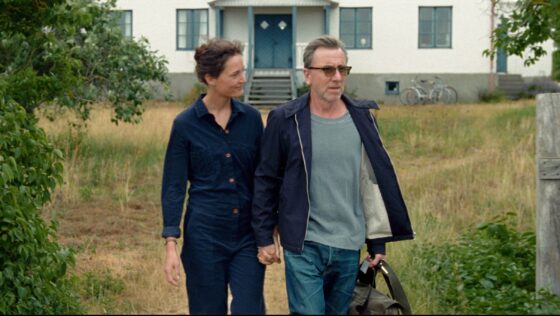TIFF 2021 | Bergman Island (Mia Hansen-Løve, France)

By Jay Kuehner
The concept of a Bergman Safari on the island of Fårö is something that not even a Roy Andersson would have conceived of, but it’s a tour bus that many cinephiles have been riding for years, like it or not. The punchline afforded in Mia Hansen-Løve’s faintly brackish, irreverent homage is that the tour’s concluding picnic offers a traditional lamb burger that is liable to make even the most devoted Bergmanite a little sick to their stomach.
Or so Tony (Tim Roth) complains to his wife Chris (Vicky Krieps) after she goes missing for the occasion, instead alighting with a local in his Volvo for a more authentic or at least less idolatrous tour. The married couple seem at once enchanted by the opportunity to fulfill their artistic residency in such an auspicious locale, and choked by the inescapable fog (Bergman weather) that is the director’s legacy shrouding the island. Both filmmakers who’ve come to work on their respective screenplays (she at the desk in a windmill, he in the house), they diverge in romantic and creative temperament with a seemingly nourishing bristle. If he’s an auteur, she’s merely a director, intimates Hansen-Løve in her depiction of the contrasting receptions they receive from the host of industry peers loitering devotionally on the island. (Read what you will into the autobiographical parallels of Hansen-Løve’s former relationship with Olivier Assayas.)
If both Hansen-Løve’s and Chris’ constructs—the latter materializing as a film within the film, taking its narration from Chris confiding her story to a distracted Tony—feel something like Through a Glass, Lightly, that may be by design. We’re watching an altogether different take on scenes from a marriage, in which the notion of female authorship has been carved out as both structural and spiritual possibility. Never mind that Chris’ own autobiographical film may be tepid, and stars a romantically self-flagellating actor (Mia Wasikowska) who too is adrift on Fårö and is delusional in her own way—this is contained within the fertile expanse of Hansen-Løve’s archipelagic imagination, ideally (unlike Bergman) with some faithful coherence between art and life (which includes for Chris, and by extension Hansen-Løve, the bond between mother and daughter).
Parsing white from off-white (in the case of an ill-chosen dress that Wasikowska’s Amy has brought to the island wedding) obviates any chance that the film is blackly dark. Hansen-Løve’s tale, seemingly beholden to an honorary pall, will either beguile or chagrin, but at the least it holds out an alternative to being haunted by the same old ghosts.
Jay Kuehner- « Previous
- 1
- 2


